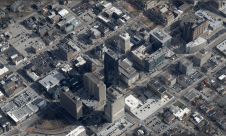I will be your Champion - GeoPlace Awards 2016
The annual Geoplace event celebrates achievements by local authorities in using addressing to make savings and efficiencies. It was also an opportunity to hear several opinions and thought leaders, including a government minister.
It seems incredible but Geoplace is already five years old. Formed out of the former NLPG and OS addressbase products, Geoplace brings together data from Ordnance Survey, the Valuation Office, other government departments and Royal Mail to create a comprehensive address file listing thousands of individual address points.
Opening GeoPlace’s 2016 conference in the plush surroundings of Westminster’s QEII conference centre, CEO Richard Mason paid tribute to the local authorities which are the organisation’s foundation. ‘Today we are much better recognised by CEOs and politicians”, he believes. Intriguingly there’s even been mention in the Budget of a £5m sum to set up an “Authoritative Address Register”. Watch this space.
Mason reported that OS MasterMap’s Highways Network now includes GeoPlace’s data. On updates, he reported that data from the Royal Mail’s PAF file is now available on a daily basis and the eventual aim is for real-time updates. A further development is a UPRN (unique property reference number) for health facilities. Subject to personal data protection it could eventually be down to patient level.
Serious Interest
The event attracted serious interest from government in the form of a short address by Rt Hon Matthew Hancock, currently Minister for the Cabinet Office and Paymaster General. He also attends Cabinet meetings. He reflected on the role addresses have played from the time of Edward II when it was necessary to write notes on the front of a letter describing its delivery point to Charles I when the Royal Mail service was first made available to the public, to today when the Geoplace file now contains over 40 million addresses. Hancock’s first job was in the family computer software firm where he struggled with magnetic tape and a PAF file without postcodes.
Today addresses are the bedrock of a modern digital economy, he argued – high quality and definitive; and we’ve barely scratched the surface for potential apps. The mission is to improve the lives of citizens. While letterboxes don’t need to be precisely located, postcodes in rural areas can land you in the middle of a field. With a UPRN a definite position is possible and is the jewel in the heart of the addressing system and ready for a world of driverless cars and delivery drones.
Hancock spoke on open data and how the UK was first in the world to go down this path, removing licences and paywalls. By opening up data he revealed that it is estimated to contribute an extra 0.5% to GDP each year. The £5m mentioned in the Budget for a new open address database could open up huge potential, he thought. In Denmark, a similar initiative has been estimated to have had a benefit factor of 20 times its cost.
Taking a few moments for questions, he was told that too often the work of the address custodian is not understood: it’s not a ‘Noddy job!’ he was told. ‘Too right it’s not said Hancock, I will be your champion. I feel your pain and make a commitment to champion your cause’.
Best in the World
Nigel Clifford, CEO of Ordnance Survey spoke about how place and UPRNs matter, ‘they map our lives’. He is determined that OS will help GB use place to become smarter. In the US Big Data had helped New York Mayor Michael Bloomberg to create a database of dangerous buildings, while nearer home in Manchester there is now a scheme for people to report vacant sites with potential for housing. Clifford reported that there are now 4200 public sector customers using the PSMA (public sector mapping agreement). ‘You have the best open data in the world’ he was told by a Silicon Valley giant.
Next up was Geoplace’s Steve Brandwood, head of engagement, with case studies of how address data was ‘a platform for interoperability reducing fragmentation’. Using UPRNs in Barnsley the local authority had been able to link eight disparate databases. Moves like this deliver real savings to councils not only in Barnsley but Harrow, Salford, Leeds and Huntingdon. Typical savings can come from previously missed properties which should have been paying council tax.
Savings Account
Calculating the return on investment in these practices is a rather dry subject, conceded Andy Coote. His company, ConsultingWhere had been retained by Geoplace to research savings. Using a combination of literature, questionnaires, training courses, a workshop and a ‘peer economist review’ his firm had used the PESTLE approach – political, economical, social, technological, legislative and environmental, under Treasury Guidelines for cost-benefit analysis.
The area of maximum benefit revealed by the study was around data sharing and integration. Savings in total of £23m with revenue and transport route optimisation contributing £17m and £2.5m respectively.
Meanwhile, the barriers to adoption included lack of funds, insufficient management awareness and software limitations. Coote is an evangelist for the benefits of addressing but danger lurks he says in not maintaining a good database. He urged greater collaboration with national bodies like SOCITEM and NESTA and advised looking at EU research and the small cities initiative.
The day-to-day users of Geoplace data are the local authority custodians. ‘There were one and a half million changes last year, explained Cathy Coelho, principal chair of the Regional Address Group.
This fascinating day which explored in detail how addressing can save substantial sums for the public sector included several breakout sessions, a panel discussion and the Exemplar Awards hosted by Juliet Whitworth of the Local Government Association.
Winners
The Exemplar Award is awarded to the best example or demonstration of local address and/or street datasets providing quantifiable benefit to the citizen/authority/region/nation.
This year’s winner was Leeds City Council for its project to use local address data to verify population estimates. By using accurate data on the number of residential units, where they are located, and which ones are vacant, a far more accurate population estimate is able to be calculated at any period of time.
Using the address data to provide a more accurate population estimate has ensured that the council has access to the most geographically accurate data available reflecting localised changes, to enable them to account more efficiently for current and future service provision such as school places, social service provision and housing needs; and could be used more widely in government to predict localised demand for health services such as GPs and Dentists.
The winner of the Peer Award was David Lloyd from Huntingdonshire District Council. Nominated by their fellow Authority Address and/or Street colleagues in England and Wales, this Award aims to reward contribution to the community, and/or achievement within an authority.
David is an expert on addresses and has been at the forefront of address innovation and integration at Huntingdonshire for many years. He has guided the work of technical working groups, been vice chair and now chair of the East of England regional group for addresses. He has always been very accessible to Custodians, providing advice and guidance to those who are new to the challenges of address management. David regularly runs specialist events such as demonstrations of software modules, for other authority colleagues.
David has been a tireless advocate for the integration of the LLPG into other council systems. The number of awards winners, runner up and highly commended show just how much effort he and his small team have put into making their LLPG a key part of their council’s processes. David is an outstanding example of best practice and is a very worthy winner of the Peer Award.
A key focus of the 2016 Exemplar Awards is on those Custodians who have invested time in creating and continually improving their processes and who have made and achieved a real commitment to improving both the accuracy and quality of the data submitted to the GeoPlace hubs. These authorities are recognised within the Data Quality and Improvement Awards.
South Ribble Borough Council and Barnsley Metropolitan Borough Council were announced as winners of the Most Improved Address Data and Most Improved Street Data respectively.
Awards were also presented for Best Address Data in Region and Best Street Data in Region together with Awards for those at ‘Gold’ Standard – those who have achieved and consistently maintained the highest standard.
This article was published in GIS Professional June 2016

Value staying current with geomatics?
Stay on the map with our expertly curated newsletters.
We provide educational insights, industry updates, and inspiring stories to help you learn, grow, and reach your full potential in your field. Don't miss out - subscribe today and ensure you're always informed, educated, and inspired.
Choose your newsletter(s)
























